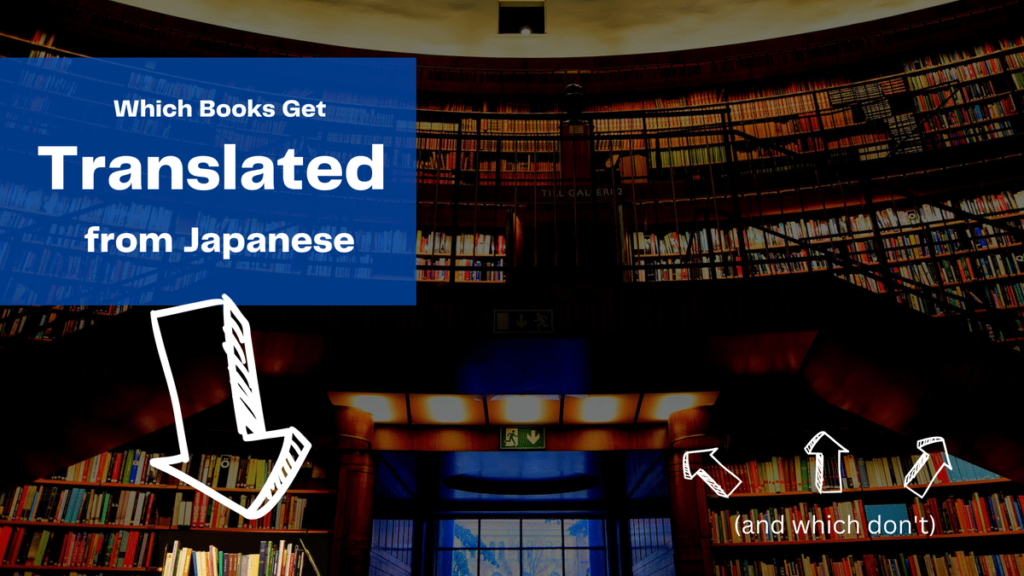[ad_1]
Traveling to Japan? Get some Japanese under your belt today with Rocket Languages Japanese and make your trip even more fulfilling! (First lesson free)
“I saw clearly that there were plenty of books that are relevant but not being translated into English that fall into certain genre categories,” Long explains. “Lots of historical fiction, mysteries and thriller, and quite a bit of young adult fiction.”
This tracks with Japanese bestselling book rankings on Amazon and Kinokuniya. Out of Kinokuniya’s twenty bestselling novels, half were either mysteries or historical fiction.
In fact, out of Kinokuniya’s top twenty books, just seven were fiction. The other thirteen were nonfiction. Meanwhile, just three of the Japanese books translated into English last year on the Publisher’s Weekly database were nonfiction.
“These are works that are having some kind of resonance in the Japanese market, but aren’t going to get picked up by publishers in the U.S.,” Long says. “It’s the popular genres that are not as well represented.”
Long reasons that writers have to achieve a certain level of renown, or clear a bar of artistic merit in order to receive consideration for translation. “While there’s clearly a market for genre fiction in the U.S., we just don’t see those works transfer.”
Life hacks and romantic mysteries abound

A closer look at a few of the best-selling Japanese books reveals certain trends.
The nonfiction options have titles like How to Use Limited Time; Driving: An Ambassador from the Past to Change the Future; Money School: How to Obtain Real Freedom; and Lessons My Mom Left Me: Become a Person You Can Please. Japan has a huge market for “life-hack” or “self-improvement” type of books, to the point where there are a number of publishing companies that focus almost entirely on them.
Only a few works of fiction in Japan compete with these mega-sellers. Some of those that do are relatively literary. One example of the kind of book that can (and did) compete: Arrogance and Goodness by Mizuki Tsujimura, one of Japan’s most popular writers. She has received an English translation before, with 2017’s Lonely Castle in the Mirror (affiliate link). Her most recent centers around a young man searching for his missing fiancée. It received rave reviews.
Drop a bit down the list, however, and the fiction titles are by-and-large a mix of historical fiction, romance, and thriller. Very few of these titles receive English translation, aside from a few notable exceptions like Keigo Higashino, an all-time renowned mystery novelist.
“In recent years, Japanese critics have discussed how users tend to dislike spending time absorbing a work, whether it’s a novel, a movie, or manga,” explains literary critic and book reviewer Saori Kuramoto.
“Commercial content across all genres has gotten ‘faster’ in recent years. We can see this in many popular light novels, which are primarily isekai reincarnation stories. Rather than creating a complex character, authors use an easy-to-grasp symbolic setting. I get the sense that authors settle the arc of the story at a very early stage of the work’s development.”

Women dominate the literary scene in translation
Of the 28 Japanese works that appeared in English translation in 2022, 19 of them were written by women. Many of the leading Japanese authors in translation—Yoko Ogawa, Sayaka Murata, Banana Yoshimoto—are women.
This trend doesn’t only emerge in the U.S. or the English language. It stems directly from the contemporary Japanese literary scene.
One example that made the headlines: all of the candidates for last year’s prestigious Akutagawa Prize were women. It marked the first time ever that all candidates were women since the award started in 1935.
“While it’s violent and problematic to generalize all of the novels by female writers, one defining characteristic in recent years is that these books cover the stories of people who are in vulnerable positions in society and don’t receive proper care from the world around them,” says Kuramoto. “For example, a protagonist caught in a difficult working situation due to not having a stable, full-time job, or a societal ‘invisible’ who doesn’t have either a healthy mind or body.”
Shifting literary tides
Kuramoto surmises that leading Japanese literature today has shifted from experimenting with rhetorical devices and literary techniques towards representing and uncovering issues in modern society. At the same time, Long says that most of these award-nominated writers write in a highly literary mode, attentive to style and language.
“The main thing is that we’ve seen an opening-up from the days of a Murakami-dominated literary world,” he says.
As of 2023, Japan’s leading critically-regarded writers make it into English. A lot of manga and light novels come along with them—and not much in between.
Will English language publishers will attempt to close the gap by translating Japanese non-fiction and genre fiction? There’s a big world of Japanese books out there, waiting to cross the linguistic sea.
What to read next
Discover These Five Japanese Mystery Writers (Who Aren’t Higashino Keigo)
Other Sources
50 Best Japanese Books of All Time. Japan Objects
Which Countries Produce the Most Books? Statista
[ad_2]
Source link


